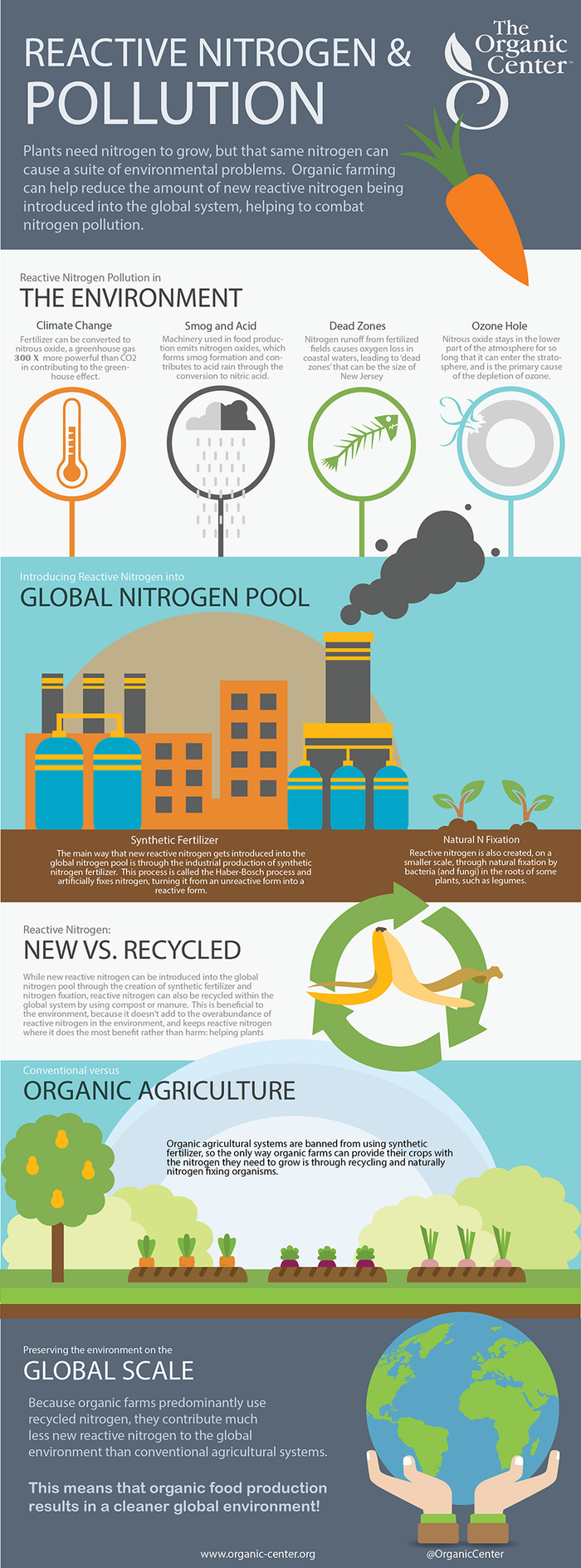New research shows organic farming can curb nitrogen pollution
Organic farms use recycled sources for 80 percent or more of the nitrogen used to grow food, meaning less reactive nitrogen is released into the atmosphere, ground and water.
March 7, 2018

Organic farming can help reduce nitrogen pollution on a global scale because it recycles nitrogen, thus creating far less reactive nitrogen than conventional agriculture, according to a new study from The University of Virginia and The Organic Center.
With The Organic Center’s previous findings that organic farming practices keep more carbon in the soil—and out of the atmosphere—than other farming methods, this study shows that organic food and farming create a cleaner global environment.
“Agriculture adds a large amount of nitrogen into the environment during the food production process,” said Jessica Shade, director of science programs for The Organic Center. Shade has a doctorate in integrative biology from the University of California, Berkeley.
Nitrogen in some form is required for all life. Most nitrogen is found in the air and can’t be used by plants or other living things, and does not contribute to air or water pollution. But when that nitrogen goes through a chemical process, it becomes reactive. Reactive nitrogen is what’s used for plant and animal growth, but it also can cause a host of environmental problems. More and more of the benign nitrogen on Earth is being transformed into the reactive form, primarily through the creation of synthetic fertilizer.
“This research is significant and timely because its findings show that many common organic farming practices—like composting and the use of manure fertilization in place of synthetic fertilizers—can recycle reactive nitrogen that is already in the global system rather than introducing new reactive nitrogen into the environment, and thus have a much smaller environmental impact,” Shade said.
The study, led by professor James Galloway and a team at the University of Virginia, found that organic farming helps prevent nitrogen pollution by recycling or reusing three times more reactive nitrogen than conventional farming. Galloway studies the positive and negative effects of reactive nitrogen on the atmosphere, land-based ecosystems, and freshwater and oceanic ecosystems.
The study also found that almost all the nitrogen used to produce the food in a conventional diet—93 percent—was newly created reactive nitrogen. In comparison, for an average diet of organic foods, only 33 percent of the nitrogen used to produce the food was new reactive nitrogen. The rest of the nitrogen used for plant growth in organic production was already in existence and was being recycled.
Organic maximizes the benefits of nitrogen but limits the harm
Agriculture uses a huge amount of reactive nitrogen to grow crops, and much of that nitrogen is lost to the environment during the food production process. As the reactive nitrogen moves through the environment, it creates a cascade of detrimental environmental impacts, including climate change. The challenge is to maximize the benefits of reactive nitrogen while minimizing the negative environmental and human-health effects.
Fertilizer can be converted into nitrous oxide, a greenhouse gas 300 times more powerful than carbon dioxide. Nitrous oxide can enter the stratosphere and eat away at the ozone; it’s the primary cause of ozone depletion. Reactive nitrogen forms smog and contributes to acid rain when converted to nitric acid. Nitrogen runoff gets into lakes, causing toxic algal blooms, and pollutes oceans, leading to oxygen loss and killing everything in giant areas called dead zones. In 2017, the dead zone in the Gulf of Mexico was the size of New Jersey, the biggest ever seen.
Organic practice does not use synthetic fertilizer. All the nitrogen on organic farms comes from recycled sources such as compost/manure, or a small amount of new reactive nitrogen from nitrogen-fixing bacteria in the roots of cover crops or other legumes. Those same sources also build a complex and rich soil that holds onto nitrogen longer, instead of allowing it to run off the field.
The research is the first study to quantify on a global scale how organic practices contribute to nitrogen pollution versus conventional practices. The results show that organic far exceeds conventional in recycling nitrogen. Conventional farming relies heavily on the creation of new reactive nitrogen: 60 to 100 percent of conventional inputs are from new nitrogen sources. Organic farms primarily utilize already existing reactive nitrogen: 80 to 95 percent of organic’s inputs are from recycled nitrogen sources. The study found that organic production releases 64 percent less new reactive nitrogen to the environment than conventional production.
“Since nitrogen is an element it cannot be created or destroyed,” said Tracy Misiewicz, associate director of science programs for The Organic Center. “The total number of nitrogen atoms on Earth remains constant, so we need to understand what proportion of the total is present in a polluting form vs a non-polluting form. This research shows that rather than converting benign nitrogen into polluting nitrogen, organic farming practices overwhelmingly recycle reactive nitrogen instead of introducing new reactive nitrogen into our environment.” Like Shade, Misiewicz has a doctorate in integrative biology from the University of California, Berkeley.
The study results will be presented at The Organic Center’s 15th Annual Benefit Dinner on Thursday at the National Products Expo West in Anaheim, California. In addition, Shade will present the findings at 2:30 p.m. Friday at the Annie’s/General Mills booth (Booth 527) on the trade show floor.
Source: The Organic Center

You May Also Like


